Ghana, the gateway to West Africa, is a country rich in history, culture, spirituality, and natural beauty. From stunning coastlines to historic castles and vibrant cityscapes to peaceful spiritual retreats, Ghana has something for every traveller.
Whether you’re an adventurer, history lover, nature enthusiast, or someone seeking spiritual depth, this beautiful country will leave you refreshed and inspired. Here are the top 10 places to visit in Ghana—each with its own unique charm and story.
1. Anagkazo Campus, Mampong
Tucked away in the cool, mist-laced heights of the Akuapim Mountains, the Anagkazo Campus stands as one of Ghana’s most peaceful and spiritually uplifting destinations. Founded by Bishop Dag Heward-Mills—a globally respected healing evangelist, mega church pastor, and best-selling Christian author—the campus serves as a premier Bible and ministry training center and a sanctuary for spiritual renewal.
The name “Anagkazo”, taken from Luke 14:23, means “compel them to come in,” reflecting the campus’s deep-rooted commitment to soul winning. With its striking blend of majestic architecture and serene natural surroundings, Anagkazo truly lives up to its reputation as a “city set on a hill.”
The campus features inspiring landmarks like the 100% Answered Prayer Garden, the scenic “Propose to Me” Bridge, the Great Hall Cathedral, the Jesus Saviour of the World Square, and even a tranquil crocodile pond. One of its most unique attractions is “The Library of the Anointed,” Ghana’s first wax museum modeled after Madame Tussauds, showcasing life-sized figures of great men and women God has used throughout history.
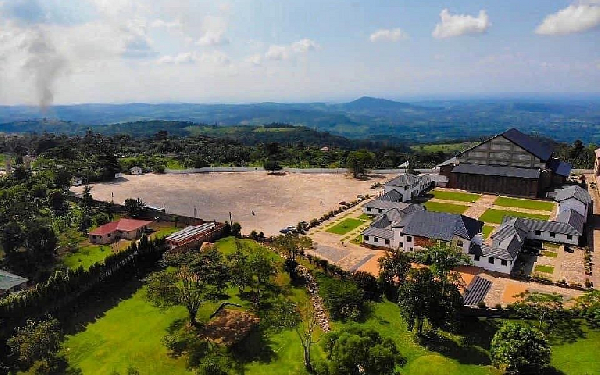
2. Kwame Nkrumah Memorial Park – Accra
The Kwame Nkrumah Memorial Park is one of Ghana’s most iconic landmarks and a symbol of national pride. Located in the heart of Accra, the capital city, this memorial is dedicated to Dr. Kwame Nkrumah, Ghana’s first president and a key figure in the struggle for independence from British colonial rule.
The park was inaugurated in 1992 on the site where Nkrumah declared Ghana’s independence in 1957. At its center is the striking mausoleum, a marble structure that houses Nkrumah’s final resting place. The architecture is symbolic—shaped like an upside-down sword, representing peace.
Visitors can explore a small museum that contains personal artifacts, photographs, and historical documents that detail Nkrumah’s life and political journey. The beautifully landscaped grounds include fountains, sculptures, and quiet spots perfect for reflection. This is not just a historical site—it’s a place where you feel the spirit of African liberation and visionary leadership.
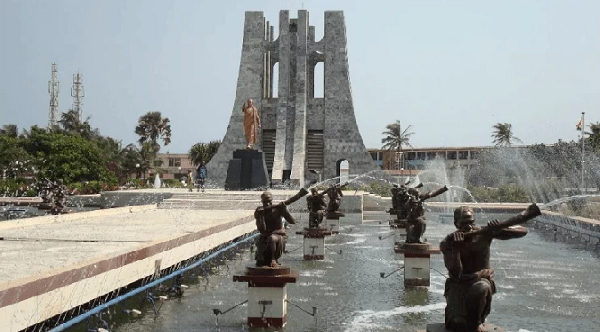
3. Cape Coast Castle – Central Region
Cape Coast Castle is a UNESCO World Heritage Site and one of the most significant historical landmarks in Ghana. Built initially by the Swedes in the 17th century and later expanded by the British, this castle served as one of the main hubs for the transatlantic slave trade.
Walking through the castle is a sobering experience. You’ll visit the “Door of No Return,” where countless enslaved Africans were taken onto ships, never to return to their homeland. The guided tours provide a detailed, heart-wrenching account of the inhuman conditions the captives endured.
Despite the painful history, the site is beautifully preserved and offers incredible views of the Atlantic Ocean. Cape Coast Castle is not just a tourist attraction—it is a place of remembrance, reflection, and education. It’s a must-visit for those who want to understand the resilience of the African spirit and the importance of preserving historical memory.
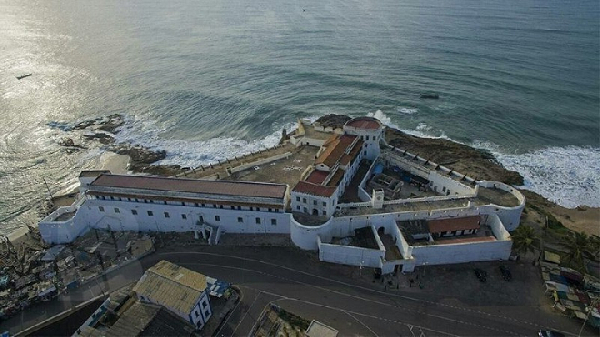
4. Kakum National Park – Central Region
For nature lovers and adventurers, Kakum National Park is a dream destination. Located just a short drive from Cape Coast, the park spans over 375 square kilometers of tropical rainforest. Its crown jewel is the canopy walkway—a series of suspended bridges over 30 meters above the forest floor, offering a bird’s eye view of the lush green jungle.
Originally established in 1931 and officially opened as a national park in 1992, Kakum is home to over 40 species of mammals, including forest elephants, leopards, and monkeys, along with hundreds of bird and butterfly species.
Aside from the canopy walk, visitors can enjoy guided nature walks, bird watching, and camping. The visitor center and museum also offer educational exhibits on conservation and the biodiversity of the region. It’s a refreshing blend of adventure and education, perfect for family trips or eco-tourism.
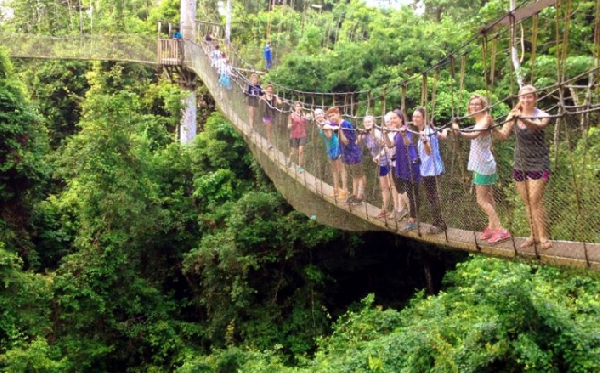
5. Elmina Castle – Central Region
Elmina Castle, also known as St. George’s Castle, is the oldest European building in Sub-Saharan Africa, built by the Portuguese in 1482. Like Cape Coast Castle, Elmina was a central point in the transatlantic slave trade and has a similar history of captivity, suffering, and resilience.
The castle passed from the Portuguese to the Dutch, and eventually to the British, each colonial power adding to its complex history. The guided tours lead visitors through slave dungeons, chapels, and colonial quarters, each with powerful stories attached.
Elmina Castle sits on a stunning stretch of coastline, and the views from the upper levels are breathtaking. Visitors leave with a mix of emotions—grief, reflection, and a deep appreciation for the strength of the human spirit. It is both a historical and emotional journey.
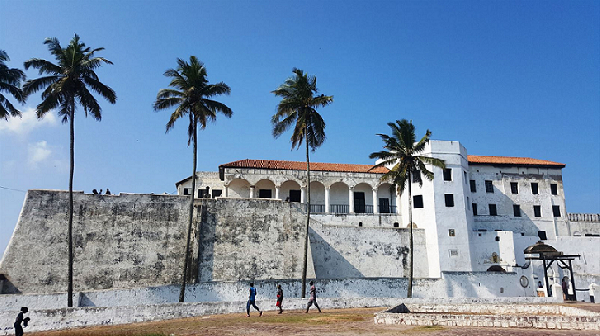
6. Aburi Botanical Gardens – Eastern Region
Nestled in the cool hills of the Eastern Region, just about 30 kilometers from Accra, lies the beautiful Aburi Botanical Gardens. Established in 1890, the gardens were originally created by the British for research into tropical plants and have since become a recreational and tourist hotspot.
Covering over 160 acres, Aburi Botanical Gardens is home to hundreds of plant species, some indigenous and others imported from across the world. The towering palm-lined avenue at the entrance is a photographer’s dream and a symbol of natural serenity.
Visitors can enjoy peaceful walks through themed gardens, learn about medicinal plants, or simply relax under the giant trees. The fresh mountain air and serene environment make it perfect for picnics, meditation, or a weekend escape from the city. For nature lovers and couples, it’s a favorite destination.
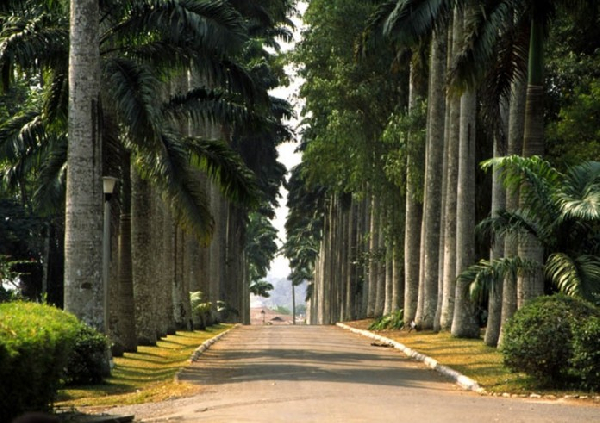
7. Boti Falls – Eastern Region
Located near Koforidua in the Eastern Region, Boti Falls is one of Ghana’s most stunning natural waterfalls. It is a twin waterfall—locally referred to as the “male” and “female” falls—and becomes especially majestic during the rainy season when the water flow is at its peak.
Boti Falls holds cultural significance among the locals, and traditional festivals are sometimes held at the site. One of the most exciting experiences is the 300-step descent that leads you down to the base of the waterfall. The sight and sound of the cascading water, coupled with the surrounding greenery, make it a perfect spot for reflection, swimming, or photography.
Nearby attractions include the Umbrella Rock and the Three-Headed Palm Tree, which add extra adventure to your visit. Boti Falls is an excellent mix of natural beauty, cultural heritage, and a bit of physical exercise.
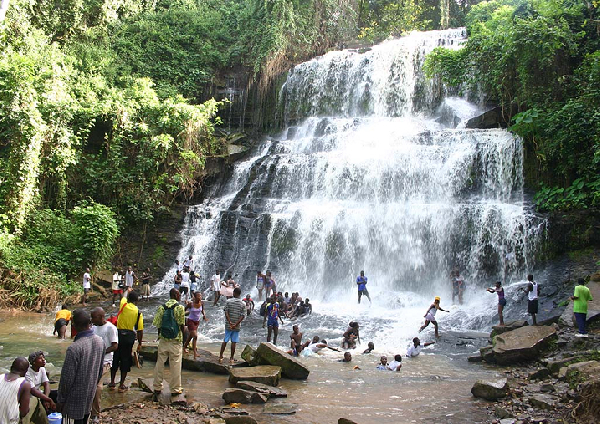
8. Mole National Park – Northern Region
As Ghana’s largest and most famous wildlife refuge, Mole National Park is a must-visit for safari lovers. Located in the Savannah Region, the park spans over 4,800 square kilometers and offers visitors a chance to see elephants, antelopes, baboons, warthogs, buffalo, and even leopards in their natural habitat.
Mole is unique because it offers walking safaris, guided by rangers, where you can get up close to wildlife in a safe, respectful way. There are also jeep safaris for those who prefer a more relaxed adventure.
The Mole Motel, which overlooks a watering hole, allows guests to watch animals gather to drink at dawn and dusk. The park also has cultural attractions, such as the nearby Larabanga Mosque, the oldest mosque in Ghana. A visit to Mole is both a wildlife adventure and a cultural immersion.
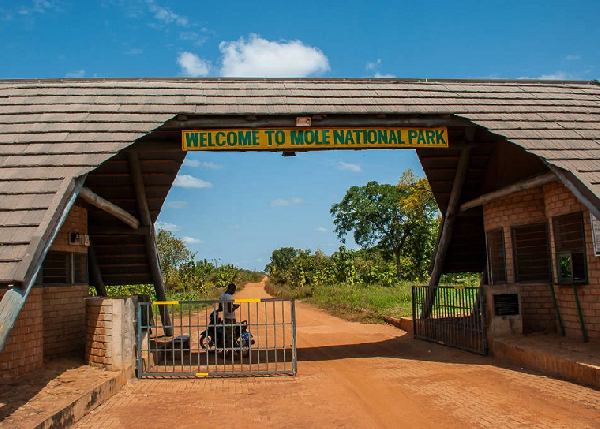
9. Labadi Beach – Greater Accra Region
If you’re looking for sun, sand, and vibrant culture, Labadi Beach is the place to be. Located in Accra, it is the most popular beach in Ghana and known for its lively atmosphere, music, horseback riding, and delicious local street food.
Labadi Beach is perfect for both relaxation and excitement. Visitors can sunbathe, swim, or enjoy live performances from local musicians and dancers. On weekends, the beach comes alive with drum circles, fire dancers, and traditional performances that showcase the heart of Ghanaian culture.
For a more serene experience, weekday mornings offer a quieter environment with stunning sunrise views. Whether you want a fun night out or a peaceful ocean breeze, Labadi Beach offers the best of both worlds.
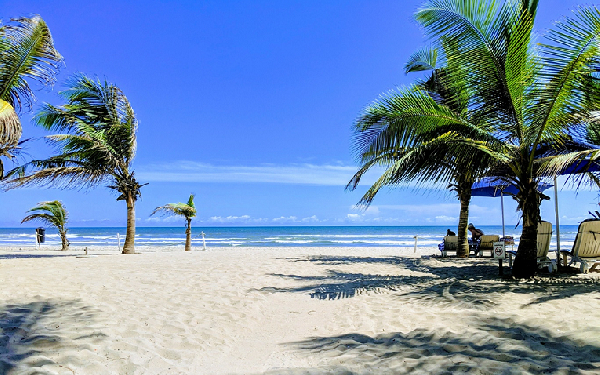
10. Legon Botanical Gardens – Accra
Spanning over 50 hectares, the gardens boast a beautiful landscape filled with indigenous trees, birds, and quiet trails perfect for walking, jogging, or simply enjoying the peaceful surroundings. One of the major highlights is the canopy walkway, which offers visitors a thrilling view from the treetops. There are also rope courses, kayaking, cycling trails, and open spaces ideal for picnics, team-building activities, or weekend family outings.
For children, the playgrounds and obstacle courses offer a safe and engaging way to enjoy the outdoors, while nature enthusiasts can explore the diverse plant species and spot colorful birds along the walking paths. Whether you’re looking for relaxation, adventure, or a bit of both, the Legon Botanical Gardens offers a refreshing experience right in the heart of Accra—making it a must-visit for locals and tourists alike.
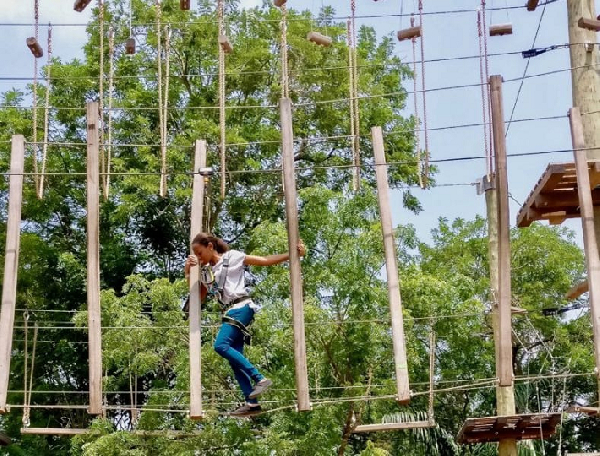
Conclusion:
Ghana is a land of deep spiritual roots, rich history, natural wonders, and cultural vibrance. From the solemn halls of Cape Coast Castle to the mountaintop peace of Anagkazo, each destination on this list offers a unique experience that touches the soul.
Whether you’re planning a mission trip, a family vacation, or a solo retreat, these top 10 places to visit in Ghana will leave you inspired, enlightened, and connected to something greater.


